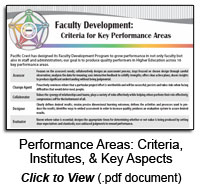|

Conventional wisdom says, “If ain’t broke,
don’t fix it.” After taking a long, hard look at our Faculty
Development Program, we concluded that it wasn’t broken—we
are still anticipating, understanding,
and meeting the various needs of our clients
with exceptional results. But the more we thought about it,
the more obvious it became that we needed to ask of
ourselves what we ask of our clients—dedication to the
bedrock principles of
Process Education (especially ongoing assessment,
continual growth and development, and the overarching value
of servant leadership). We realized that the important
question is not, “Is it broken?” but rather, “Can
we do better?” The answer, of course, was YES.
 In
that spirit, we have made many changes to our Faculty
Development Program, most of which fall into the category of
“Program and Course Design.” We have categorized our
Institutes both by developmental role as well as by area of
interest. Additionally, we have sequenced our Institutes
within each of these areas to help facilitate the greatest
growth possible for our clients. In other words, we have
created “majors” in various educational “fields,” complete
with recommended “degree plans.” We invite you to
visit our Faculty Development page to see some of
these changes. At a deeper level, we have also created 16
Key Performance Areas, each with its own performance
criteria. This means that we can now articulate the skills
and abilities that each of our Institutes builds across
these performance areas. Our
Activity Design Institute (for example) develops
skills in the areas of Design, Facilitation, and
Problem-Solving. And the criteria for problem-solving (for
instance) requires that one “ably identifies and defines
problems frequently not seen by others; identifies issues
and clarifies assumptions necessary to solve the problem;
and effectively closes the gap between expectations and
reality by using previous solutions to build upon past
successes.” We realized that we were striving to grow in
these same performance areas—we were solving problems,
designing, collaborating, assessing, and measuring. As part
of this work, we went right back to our
Classification of Learning Skills to determine what
performance looks like for all of these areas. In
that spirit, we have made many changes to our Faculty
Development Program, most of which fall into the category of
“Program and Course Design.” We have categorized our
Institutes both by developmental role as well as by area of
interest. Additionally, we have sequenced our Institutes
within each of these areas to help facilitate the greatest
growth possible for our clients. In other words, we have
created “majors” in various educational “fields,” complete
with recommended “degree plans.” We invite you to
visit our Faculty Development page to see some of
these changes. At a deeper level, we have also created 16
Key Performance Areas, each with its own performance
criteria. This means that we can now articulate the skills
and abilities that each of our Institutes builds across
these performance areas. Our
Activity Design Institute (for example) develops
skills in the areas of Design, Facilitation, and
Problem-Solving. And the criteria for problem-solving (for
instance) requires that one “ably identifies and defines
problems frequently not seen by others; identifies issues
and clarifies assumptions necessary to solve the problem;
and effectively closes the gap between expectations and
reality by using previous solutions to build upon past
successes.” We realized that we were striving to grow in
these same performance areas—we were solving problems,
designing, collaborating, assessing, and measuring. As part
of this work, we went right back to our
Classification of Learning Skills to determine what
performance looks like for all of these areas.
 While
there isn’t a ‘bottom line’ to the recent improvements in
our Faculty Development Program, we are pleased to announce
that, because of the changes we’ve made, Pacific Crest and,
more importantly, our current and prospective clients, will
be able to navigate more easily and effectively through the
sometimes turbulent waters of institutional, professional,
and personal transformation. We understand that the change
required for growth is rarely easy and that having clear
directions and an informed plan can make all the difference
in the world...we understand because during this project,
we’ve made and reaffirmed our own commitment to growth and
transformation. While
there isn’t a ‘bottom line’ to the recent improvements in
our Faculty Development Program, we are pleased to announce
that, because of the changes we’ve made, Pacific Crest and,
more importantly, our current and prospective clients, will
be able to navigate more easily and effectively through the
sometimes turbulent waters of institutional, professional,
and personal transformation. We understand that the change
required for growth is rarely easy and that having clear
directions and an informed plan can make all the difference
in the world...we understand because during this project,
we’ve made and reaffirmed our own commitment to growth and
transformation.
|
![]()

